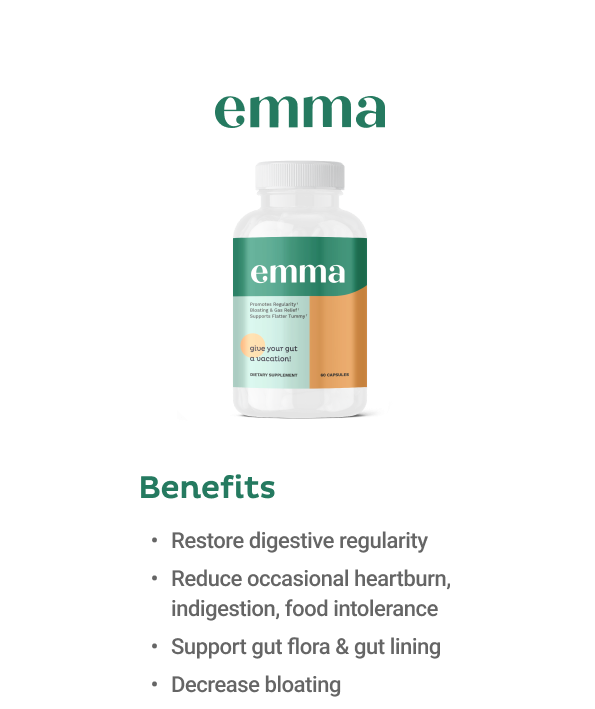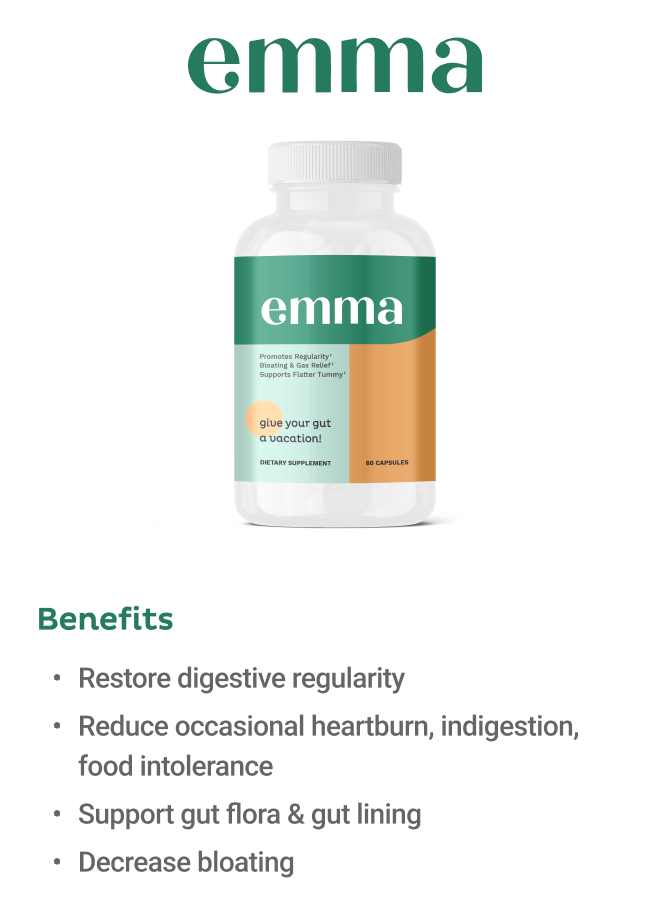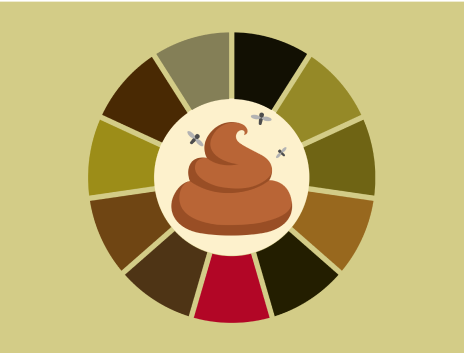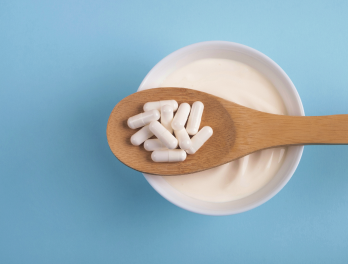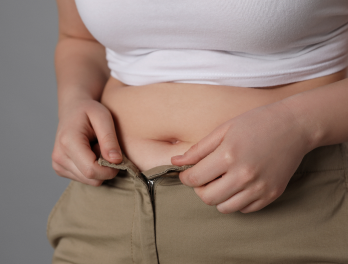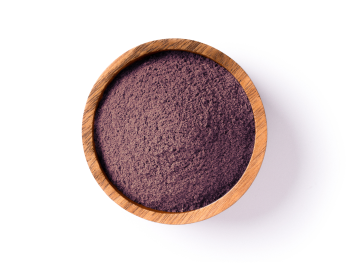Bloating, discomfort, and gas are just a few of the things you experience when you are constipated.
Experts consider you constipated if you have less than three bowel movements a week. It’s also
constipation if you have hard, lumpy stools, find yourself straining, or feel all the stool isn’t out.
About 1 in 5 people experience ongoing constipation, and
the numbers go up
to 1 in 3 in older people.
Fortunately, diet changes, hydration, and exercise can help keep you regular. And in a pinch, home
remedies for constipation are safe effective aids for pooping that have been used for ages. Here we
share more about remedies you can try at home to keep you regular all week.
Stay Hydrated: Water's Role in
Preventing Constipation

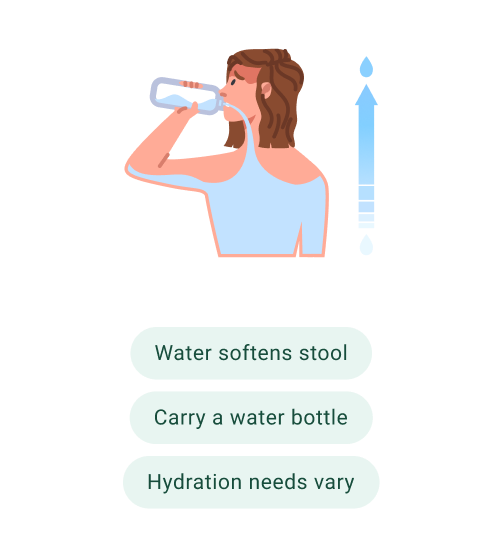
You are more likely to experience constipation if you are constantly thirsty and dehydrated. Water
helps soften your stool and moisten your digestive tract. It lubricates your digestive system helping
its contents move smoothly toward the exit.
The amount of water you need depends on your
sex and lifestyle.
For example, women need about 11.5 cups (2.7 liters) a day but that could increase if you are
breastfeeding or involved in rigorous work. Men need about 15.5 cups (3.7 liters) a day.
You may need a little more if you’re in hot environments or engaged in rigorous activities.
You can carry a water bottle and sip it through the day to make hydration easier. Lemon, mint, and
herbal teas like green tea can help improve the flavors and encourage you to sip more. You can also
get water from clear soups, vegetable juice, and unsweetened fruit juice.
Regular Exercise: Keeping the Body and Bowels Moving

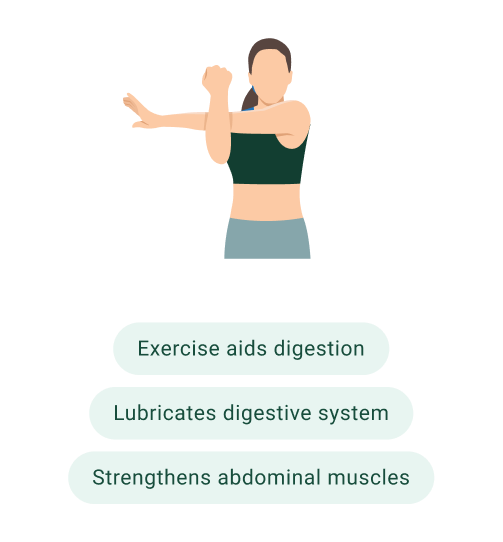
Physical activity has amazing benefits for your body and mind, including helping you prevent and treat
constipation. Exercise increases blood flow to your gut, helps strengthen your abdominal muscles, and
stimulates your intestines to contract, moving stool through your digestive system.
Exercise helps speed up the time food passes through your gut helping form stool more quickly.
Several
studies show
exercise helps relieve constipation. For best results, it helps to move after meals and make it a
regular habit. Walking, cycling, yoga, and swimming are some exercises you can start with.
High-Fiber Foods: Nature's Laxative

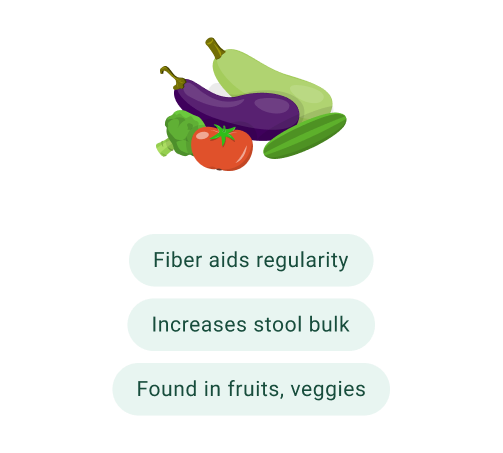
Fiber
is the main nutrient you need to stay regular. You need about 25-30 grams a day for your digestive
tract to work well. Fiber increases the stool bulk and helps your digestive tract push it downward and
outward.
Fiber is abundant in most natural vegetables, fruits, legumes, and whole grains. Some rich sources
include beans, carrots, oats, broccoli, peas, chia seeds, mangoes, oranges, acorn squash, pears, and
berries.


Prunes and
Prune Juice:
The Classic Remedy


No list of constipation-treating remedies would be complete without prunes on it. For many people,
prunes have a powerful effect on their bowel habits, providing near-instant relief. Prunes have a high
fiber content.
And they contain a sugar called sorbitol content that helps draw fluid into your digestive tract and
flush everything out smoothly.
As fresh fruit, dried fruit, or juice, this tart and tangy elixir has proven effective in several
scientific studies.
Studies found prune juice
more effective
than psyllium (a commercially available fiber laxative) in helping people poop. Scientists recommend
that prunes be used as the first treatment for mild to moderate cases of constipation.
Herbal Teas: Gentle Relief for Constipation

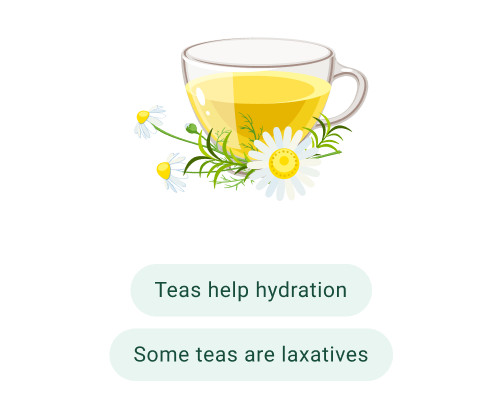
Quick relief for constipation may be in your kitchen cupboard—in your herbal tea collection. Herbal
teas have helped ease stomach troubles including constipation for ages.
For starters, teas are high in fluid and help you stay hydrated. In addition, some have a laxative
effect helping you pass stools easily.
Some teas that may help include licorice, dandelion root, fennel, black tea, elderberry, chamomile,
and ginger.
Aloe Vera: More than Just a Burn Remedy

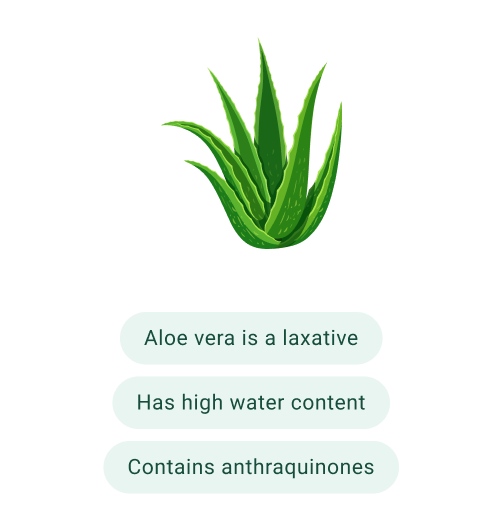
Aloe vera is celebrated for its ability to hydrate, cool, and moisturize human cells. Unsurprisingly,
it also acts as a laxative helping stools pass quickly and effortlessly.
It has a high water content which helps keep your digestive tract hydrated and contains special
compounds called anthraquinones that stimulate bowel movements.
However, it should be used with caution because it has both been approved as a laxative by the US Food
and Drug Agency. It has been linked to side effects including cramps, diarrhea, potassium deficiency,
and kidney damage.
Probiotics: Balancing Gut Bacteria for Smooth Digestion

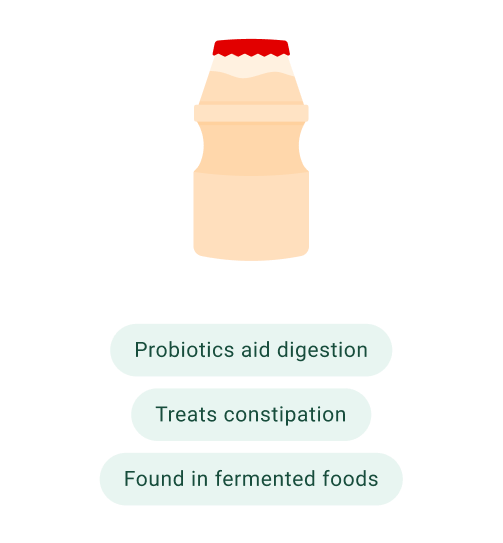
Probiotics are another great tool in your constipation home remedy kit. Probiotics are live, helpful
bacteria that can be found in fermented foods such as kefir, tempeh, kombucha, and sauerkraut.
"Probiotics promote digestion by providing bacteria that feed your gut and replace harmful bacteria in
the body," says
Patricia Kolesa
MS, RDN founder of Dietitian Dish LLC. She also recommends speaking to your care team before taking
any dietary supplements.
Scientific
studies found
probiotics are a useful tool for treating constipation. Research shows that probiotics may help
nourish your gut and promote the growth of helpful gut bacteria.
Eventually, this helps your food digest properly and quickly, preventing you from experiencing
build-ups, gas, and difficulty passing stools.
You may experience some digestive issues like diarrhea, gas, and nausea when you take probiotics for
the first time. But those symptoms usually resolve over time.
Probiotics are helpful for childhood constipation and constipation in pregnancy but you should not use
them if you have low immunity (for example if you have diabetes, HIV, had a recent organ transplant,
or are having chemotherapy).
Magnesium Supplements: An Essential Mineral for Digestive Health

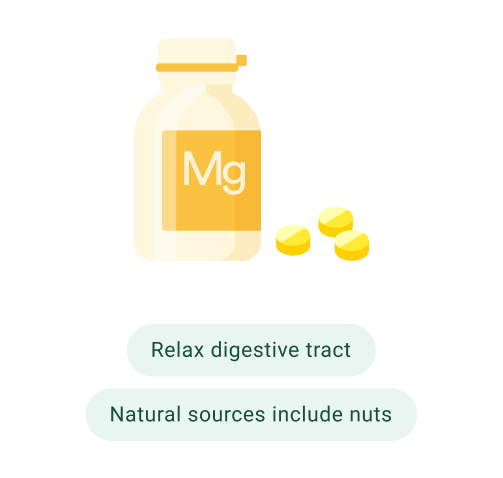
You can also support your digestive tract by taking a magnesium supplement. Magnesium supplements are
available over the counter or online.
They help you get the right amount of magnesium which supports so many processes in your body
including heart function, sleep, and exercise.
Plus, magnesium supplements help relax the digestive tract and increase the water in your intestines,
which allows bowel movements to pass more easily.
“Pumpkin seeds, chia seeds, almonds, black beans, and edamame are good sources of magnesium. These
foods are also high in fiber so they are great to add to your diet to help you poop!" According to
Sarah Alsing, MS, RD, owner of
Delightfully Fueled.
You can get magnesium naturally from foods like nuts, green leafy vegetables, and whole grains. Most
people have normal levels, but if you have a condition like irritable bowel syndrome your levels may
be lower than normal and you may need to supplement.
The maximum dose for magnesium is 2000 milligrams a day. The supplements usually come in 500mg
capsules or tablets. So you shouldn't take more than 4 of them in a day.
If you experience black tarry stools, diarrhea, or dark coffee-brown vomit, you should stop the
supplements and seek medical care. Also, you should not take magnesium supplements if you have kidney
disease.
Mindful Eating: The Importance of a Slow, Considered Approach to Food

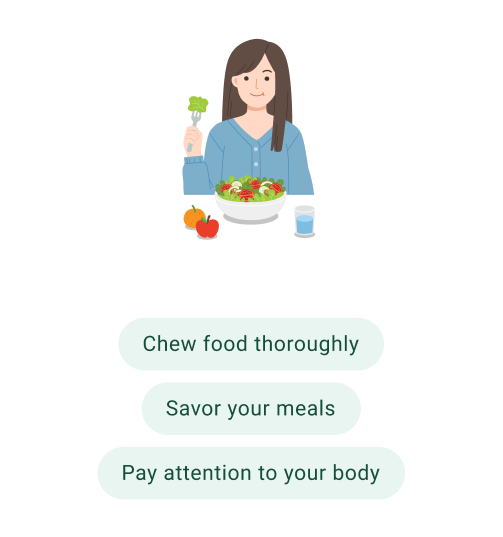
Rushed, thoughtless meals can contribute to backing you up. On the other hand, if you eat mindfully
you support your digestive system to work well and reduce your constipation risk.
Mindful eating practices such as eating at a designated place, chewing your food thoroughly, savoring
your meals, paying attention to your body, and making deliberate food choices support your digestive
system to
work well
and help your mental well-being too.
Almost everyone feels backed up from time to time. Developing the right habits of regular exercise,
drinking enough water, and mindfully eating fiber-rich meals, can help you tilt the scales in your
favor.
For quick relief, prune juice or prunes are a tried, tested remedy backed by science that may be
useful. You can also support your digestive system (and bowel habits) by taking probiotics, magnesium
supplements, and herbal teas.
If nothing seems to work, it’s a good idea to seek medical attention. Your doctors will help find the
cause of the problem and help treat it.


FAQs
What are some natural remedies for constipation?
There are lots of natural remedies for constipation. Staying hydrated, eating high-fiber meals, and
having a few prunes or some prune juice helps.
You can also consider moving more by walking, cycling, swimming or any other kind of exercise.
Drinking herbal teas like licorice, chamomile, and black tea may also help.
How can I relieve constipation without using medication?
You can relieve constipation without using medication by supporting your body to pass regular
stools. When you eat mindfully, drink plenty of water, exercise, and eat a high-fiber diet, you are
less likely to get constipated.
Try eating lots of high-fiber foods such as mangoes, oranges, carrots, cucumbers, beans, and
bananas. Eating prunes and drinking prune juice is also a quick, effective remedy that helps many
people empty their bowels.
Are there specific foods that can help with constipation?
Yes, there are specific foods that can help with constipation. Prunes are well known for their
ability to help with constipation both as fruit and as juice.
Other foods rich in fiber such as mangoes, beans, green leafy vegetables, carrots, cucumbers,
paw-paws, and oranges are also helpful.
Fiber is a key nutrient that helps you form stools and pass them, so you should eat foods with lots
of fiber in them.
Foods with a high water content such as grapes, pineapples, and watermelons also help because water
flushes your digestive tract.
However, you need to pay attention to the effect the fruits have on your body. For example, apples
can worsen constipation in some people because they contain a compound called pectin that can harden
stool.
What are some specific home remedies for constipation?
Some specific home remedies for constipation include prunes and prune juice, herbal teas, Aloe Vera,
probiotics, and magnesium supplements. You should try them all at once because that could increase
your side effects risk.
You can try prunes or prune juice first if you have some. And then try a herbal tea such as senna or
rhubarb. For best results, you should get enough exercise, drink plenty of water and mindfully eat
fiber-rich meals too.
Does drinking water help relieve constipation?
Yes, drinking water helps relieve constipation. Water is a key part of the juices, enzymes and
fluids your body makes during digestion. Also, when you drink enough water you help create enough
bulk in your digestive tract to make stools.
The amount of water you need each day varies from person to person. Women should aim for about 2.7
liters and men for about 3.7 liters every day. You can drink more if you are in a hot environment,
breastfeeding or involved in rigorous activities.
Apart from sipping the clear stuff, you can add flavor to your water with lemons or mint. Also, You
can get extra water from clear soups, vegetable juices, and homemade fruit juice.
Can exercise help with relieving constipation naturally?
Yes, exercise can help with relieving constipation naturally. When you move more, you increase blood
flow to your gut and strengthen your abdominal muscles. Ultimately, that speeds up the passage of
stool in your gut and helps you pass stools easily.
Are there herbal teas that aid in relieving constipation?
Yes, there are herbal teas that can help relieve constipation. Herbal teas such as dandelion leaf
tea, apricot tea, ginger tea, chamomile, and black tea can help you stay regular.
How much fiber should I consume to prevent constipation?
To prevent constipation, you should consume 25-30 grams of fiber a day for women and 30-38 grams a
day for men. But fiber isn't the only thing you need. You need to stay hydrated and exercise
regularly too.
What are some lifestyle changes I can make to alleviate constipation naturally?
To alleviate constipation naturally, your lifestyle should include regular exercise, mindful eating
fiber-rich foods, and drinking enough water. You can also consider taking probiotics, a magnesium
supplement, or a herbal tea such as licorice tea.
Is there a recommended natural laxative for relieving constipation?
There's no recommended natural laxative that works for everyone. Your best bet is to embrace
lifestyle changes that help you stay regular. Such changes include regular exercise, drinking enough
water every day, and eating food rich in fiber.
Prunes help many people empty their bowels and have been scientifically proven to be safe and
effective for easing constipation. Herbal teas, probiotics, and magnesium supplements can also help.
To know what's best for you, speak to your health care team about your options.


























